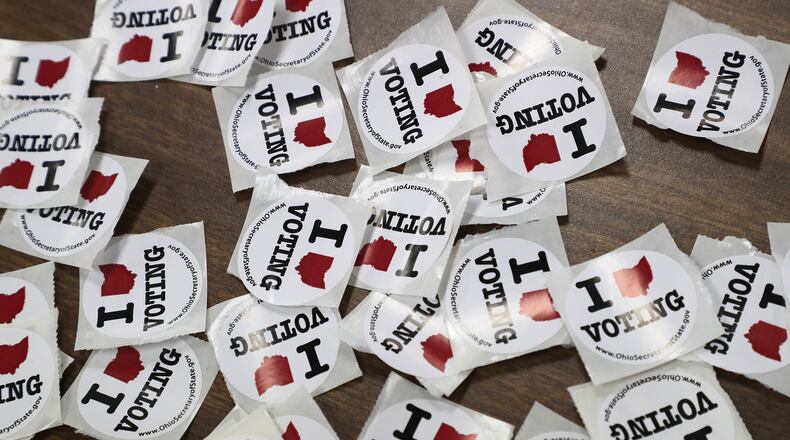“So Ohioans — along with voters in Arizona, Illinois, and Florida, who also vote on March 17 — are going to play an important role in deciding who wins, or at least who goes into the convention with more delegates,” Devine said.
RELATED: Polling sites changed for thousands of Montgomery County voters
Billionaire Michael Bloomberg, who spent millions of dollars in Ohio, dropped out on Wednesday while Indiana’s Pete Buttigieg and U.S. Sen. Amy Klobuchar of Minnesota backed out just before Super Tuesday. All three are now backing Biden. And U.S. Sen. Elizabeth Warren of Massachusetts is reassessing her candidacy.
Ohio State University political scientist Paul Beck said Biden and Sanders are likely to make personal appeals to Ohio voters. “Oh, I expect to see them a lot,” Beck said.
Although Bloomberg, Buttigieg, Klobuchar and others ended their presidential campaigns, their names will still be on the Ohio ballot and votes for them will count, according to Ohio Secretary of State Frank LaRose’s office. Only U.S. Sen. Cory Booker filed a notice of withdrawal to have signs posted at polling places that he isn’t running — ballots cast for Booker will not count.
The late-in-the-game line up shuffle shows the disadvantages of early voting in contested primaries, said Devine, who’s an Independent.
LaRose’s office reported that more than 84,100 early ballots have already been cast in Ohio as of Super Tuesday.
RELATED: Gun laws: Where do legislative candidates stand on the issues?
“In a general election, you may learn something new about one of the candidates in the final weeks of the campaign — but at least you know who the candidates are and each party has only one nominee, so in most cases there’s little risk in voting early,” Devine said. “Primaries are very different — candidates drop out, momentum changes, and voters’ strategies can shift.”
Devine’s advice? “At least for now, given the dramatic changes in this race in such a short time, the best policy might be for voters to decide to hold off until March 17 to cast their vote, so (hopefully) they don’t end up regretting it.”
Beck, a Democrat, said he voted Wednesday after holding off until the race finally took a turn.
“I’ve never seen a turnaround such as the one (Biden) managed in the past three days. It’s incredible,” Beck said.
RELATED: Presidential and state races to see primary challenges
Early voting for the March 17 primary races in Ohio is pacing ahead of 2016 with nearly a quarter-million absentee ballot requests, according to LaRose’s office. As of March 2, 41,769 Democratic ballots have been cast while 38,798 Republican ballots have been cast.
Not surprisingly, Democrats are more active this cycle than Republicans are. Democrats have a contentious presidential primary this year while the GOP had its hot presidential primary contest in 2016.
President Donald Trump is unopposed in Ohio’s GOP primary, which is a winner take all contest for 66 delegates.
The Ohio Democratic Party allocates its 136 delegates in proportion to the number of votes each candidate receives, with only candidates who receive at least 15% of the vote eligible for delegates. An additional 17 delegates are Ohio’s five Democrats elected to Congress and party leaders.
Eighty-nine delegates are awarded based on congressional districts but LaRose’s office will not report Democratic primary results by congressional district on Election Night. Instead, those results will be available on Wednesday, according to an email LaRose sent to Ohio Democratic Party Chairman David Pepper.
Information from the Associated Press is included in this report.
Key Dates in the Democratic presidential race:
March 3, Super Tuesday, 14 states held their primaries. Joe Biden won nine; Bernie Sanders won four; Maine remains too close to call.
March 10, six states hold primaries: Idaho, Michigan, Mississippi, Missouri, North Dakota and Washington.
March 17, four states hold primaries: Ohio, Florida, Illinois and Arizona.
About the Author

